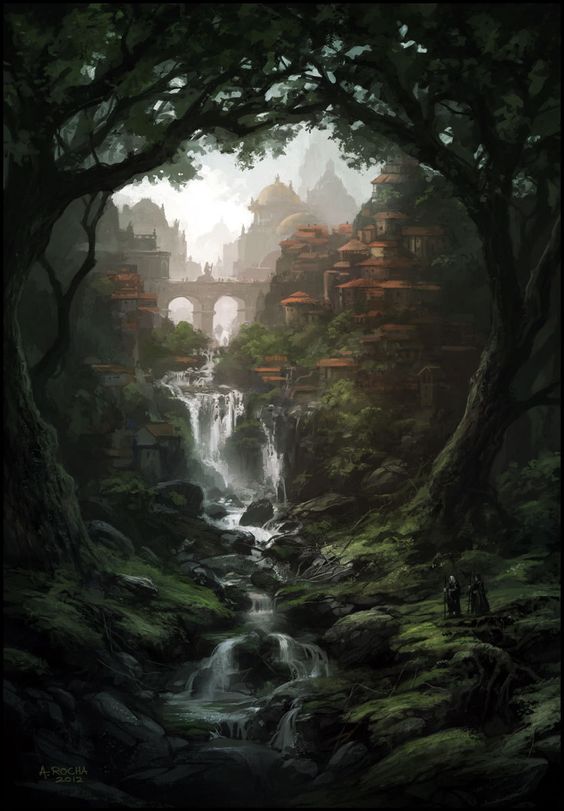Vulmari
Vulmari Dictionary and Translatory Document; as researched and notated by Highborn Professor, Lord Orm Hauksson
Background
The language of the Vulmari is an incredibly ancient one. The language itself was founded from magick and so every word can lead to become a spell in it's own right - the user just has to involve their energy. To speak Vulmari is to respect the traditions, history and culture of the Vulmari elves; the language is not to be spoken lightly. If it's used without permission by an outsider, there can be dire consequences. Not all words or phrases can be directly translated from Vulmari into the common tongue, but most can be fairly well interpreted. For example, to wish someone luck in Vulmaria, you'd say: awa'tao lha daln awas ro/ra. Translated literally, it means "forever may magick grow for him/her". A lot of their language is like this. The Vulmari are named after the forest they inhabit, Vulmar, but in their own words they are called Sulhani. Translated literally, it means "child forest" but a better translation would be "people of the forest". A number of other words can be understood by their literal translations:Powerful = Varito'sani = Power with
Calm = Lam'sani = Peace with
Other words take their meaning from the original root word. This it often from myths and legends in Vulmari culture. The Vulmari creation story is one of those, referencing the original Gods and their related elements. Vulmar literally means "wood" but it also means "life". It's also the name of the God who created everything and everyone. From this, you get vultao (woodland* [many life]). You also get: Plant = Vultai
Field = Vultaro
Crop = Vultaio
Farmer = Vuldron
History
The above image shows the first paragraph of the Vulmari creation story which, as mentioned, describes the creation of the Vulmari people and references the various Gods which go on to create the elements within the world. The Gods are as such:Vulmar = life
Adon = fire
Thatia = water
Ilai = light
Nafir = air
Firlan = sky
Amasi = stone
Amari = earth
These later became the root words for the Vulmari language, providing a foundation for other words to evolve. Like with woodland/life evolving from Vulmar, water (thatian) grew from Thatia, fire (adonn) from Adon and so on. The translation for the above paragraph can be seen below:
Before the world there was only Vulmar. He remained alone until his brother, Adon, came into creation. He brought fire and destruction until their sister, Thatia, came into creation. She brought water and calm. Together they created life and all was well. As the world was made, others came into creation. First was Ilai and light and her partner Nafir who made air. Firlan was born of Ilai and Nafir, creating the sky. Then came Amasi with stone. Amari was born of Vulmar and Amasi, creating the earth. For millennia this was the world.
- From
Vulmari Creation Story
Pronunciation
The basics of understanding Vulmari as a language can be approached by looking at the human alphabet. There are simply letters missing from this alphabet which do not exist in the written from of Vulmari. These missing letters are; G, X, Y and Z. The vowels E and U are also missing. However, there are some pronunciation differences between the human language and that of Vulmari. The "H" in Vulmari os more of a breath sound than a pronounced letter. For example, in the word Lha (magick), is pronounced "Yah". The "R" in words is slightly rolled, like a trilling sound. And any use of the letter "U" in the written form of Vulmari is, in fact, the simplification of the "oo" sound which is created by two "O" letters put together. There is no "uh" pronunciation where the letter "U" is used. *Woodland can also use the word Lhani which refers more to a "magick place", whereas Vultao refers more to a place of life; eg. the woods where the trees are alive, or the place where the Vulmari live which is the woodlandDictionary
Common Phrases
Awa'tao lha daln awas ro/ra
Forever may magick grow for him/her
For wishing luck on someone's behalf
Pi'noa rulain jah'to lanotoak. Mirno awa'tao, risuna
Your battle is finished. Goodbye forever, sibling
Said when someone has passed away, particularly in battle
Forever may magick grow for him/her
For wishing luck on someone's behalf
Pi'noa rulain jah'to lanotoak. Mirno awa'tao, risuna
Your battle is finished. Goodbye forever, sibling
Said when someone has passed away, particularly in battle
Common Female Names
Gaelin
Arryn
Ava
Lenna
Fayr
Arryn
Ava
Lenna
Fayr
Common Male Names
Kehrun
Eldar
Alanis
Faerlin
Rolyn
Eldar
Alanis
Faerlin
Rolyn
Remove these ads. Join the Worldbuilders Guild











Comments